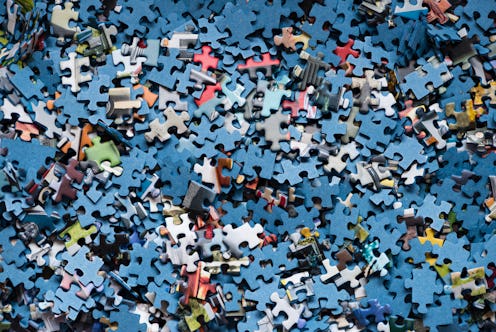Life
The Reason We're All Obsessed With Puzzles Right Now

A global pandemic brings out a strange and specific side in all of us. Canned food has basically become currency, bidet sales are booming, and even the most extroverted and impatient among us are looking for puzzles to do while social distancing. Did anyone expect jigsaw puzzles to see such a resurgence in 2020?
The world is rediscovering ways to keep ourselves entertained while practicing social distancing during the coronavirus outbreak. However, many major sports in the U.S. are taking a hiatus and there’s only so much Netflix you can watch. So, we seem to be answering the question of what to do with this unexpected downtime with analog solutions. People have turned to taking more walks, rekindling their love of tech-less hobbies like painting, and yes, doing a bunch of jigsaw puzzles.
Before you rush to the game aisle of Target, be aware that your local retailers may be going through a puzzle shortage. No, really. Brian Way of the Puzzle Warehouse told the Washington Post they sold around 10,000 puzzles per day last week, calling the spike in sales “beyond Christmas volume.” If it seems like everyone is doing puzzles, it’s because... pretty much everyone is doing puzzles. NBA players are doing puzzles. Talk show hosts are doing puzzles. Bill and Melinda Gates, who take puzzles on vacation, are probably mid-puzzle as we speak. Even Kylie Jenner is doing puzzles.
Well before the coronavirus outbreak, puzzles were seeing an uptick in sales. According to Market Watch, some reports predicted that the jigsaw puzzle industry would increase to $730 million by 2024. In other words, if you suddenly have the urge to assemble a puzzle. you’re in good company.
Jigsaw puzzles sit in this sweet spot of relaxing yet rewarding. You have a goal (finish the puzzle) but that goal is extremely low stakes. And we could all use something with extremely low stakes right now.
If assembling a jigsaw puzzle feels like a workout for your brain, that’s because it kind of is. A 2017 study on jigsaw puzzles and cognition suggests that doing puzzles may help improve your visuospatial function and spatial cognition. Another 2014 study on puzzles suggested that exposure to puzzles and games like it could result in enhanced spatial skills.
A 2017 blog post from Yale shared how colleagues used puzzles as a way to engage in collaboration, noting that puzzles are “believed to help strengthen visual acuity, build short term memory, develop problem-solving skills, increase fine motor skills” and may be “therapeutic.” Puzzles have even been touted as a way to improve your IQ
As the 2017 study states, puzzles are a “low-cost, intrinsically motivating leisure activity” that can be completed alone, with other people, during one long sitting or over the course of a week. They’re akin to analog activities like the adult coloring book trend, which has been found to improve mental health and decrease anxiety in some preliminary studies.
Is doing a puzzle going to make you healthy, cure your depression, soothe your loneliness, cure your acne, and pay off your student loans? I mean, no. But it can be a mindful, meditative way to put your brain to work and keep you and the people your stuck at home with busy.
If you’re looking for places you can still buy puzzles, check out local bookstores, thrift shops, and other second-hand stores that are still open. Goodwill almost always has puzzles though they may be missing a piece or two.
If not even self-quarantining can make you want to do a puzzle, you can still experience second-hand gratification by perusing the r/JigsawPuzzles on Reddit, a subreddit dedicated to puzzles and the people who love them. Do a puzzle on Instagram live. Turn your Zoom meeting into a collective puzzle-doing chat. (Listen, desperate times call for desperate measures.) We’ll all get through this time together, piece by piece.
Studies referenced:
Garcia, Angela C. (2014). An explorer in a cardboard land: emotion, memory, and the embodied experience of doing jigsaw puzzles. International Journal of Play, https://www.tandfonline.com/doi/abs/10.1080/21594937.2016.1203916
Fissler, P. (2017). Jigsaw Puzzles As Cognitive Enrichment. Trials, https://www.ncbi.nlm.nih.gov/pmc/articles/PMC5588550/
This article was originally published on